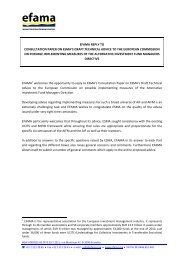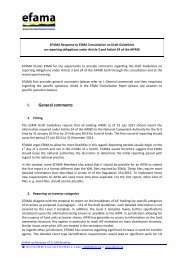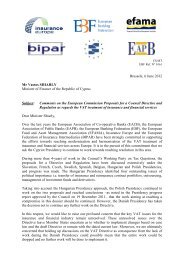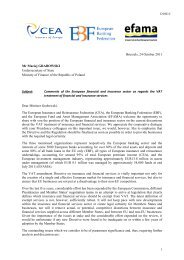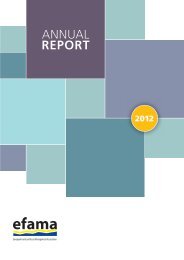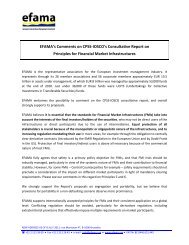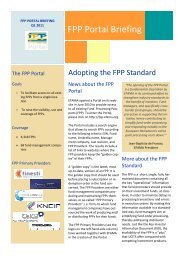EFAMA KPMG Solvency II Report
EFAMA KPMG Solvency II Report
EFAMA KPMG Solvency II Report
You also want an ePaper? Increase the reach of your titles
YUMPU automatically turns print PDFs into web optimized ePapers that Google loves.
4.1.4 Ad-hoc Data Provision<br />
Requirements<br />
Former <strong>Solvency</strong> <strong>II</strong> Consultation Paper 56 states that<br />
4 WORKING GROUP FINDINGS | 25<br />
“ …in abnormal circumstances, especially in a crisis, it might be<br />
essential for both the undertaking and supervisory authorities<br />
that updates of data used in the calculation of the probability<br />
distribution forecast be performed at shorter notice and more<br />
frequently by the undertaking.<br />
Undertakings may benefit from identifying events which they<br />
consider to be severe enough to warrant their performing<br />
non-regular, unscheduled data updates.<br />
Furthermore, undertakings should define circumstances under<br />
which they regard a prompt recalculation of economic capital and<br />
(parts) of the <strong>Solvency</strong> Capital Requirement (SCR) as necessary.”<br />
These data updates at the insurer would require additional unscheduled data from the<br />
invested asset manager or third party administrator.<br />
Challenges and Impacts<br />
The responsibility for defining the events and the required data set for an unscheduled<br />
data update lies with each insurer and, as a result, is not standardised across the<br />
industry.The turnaround time currently requested by insurers for the provision of this<br />
data varies between 48 hours and one week.<br />
Any model data, internal or external, must also meet the data quality requirements<br />
set out in the <strong>Solvency</strong> <strong>II</strong> Directive so data required for unscheduled updates must be<br />
subject to the same degree of data governance as all other <strong>Solvency</strong> <strong>II</strong> data.<br />
As the data set and trigger events remain non-standardised and, in many cases,<br />
undefined, the invested asset managers and third party administrators may be unable<br />
to agree contractual and legal obligations with the insurer to provide ad-hoc data.<br />
The IT systems and business processes in place at the asset managers and third party<br />
administrators are not designed to accommodate this level of ad-hoc data refresh<br />
and reporting. The changes required to comply with this requirement may incur<br />
considerable cost, time and effort.<br />
The usually limited turnaround time and unscheduled nature of these data requests<br />
will also limit the level of data quality testing that the asset managers and third party<br />
administrators can apply to the ad-hoc data. For example, quality checks such as<br />
© 2012 <strong>KPMG</strong> LLP, a UK limited liability partnership, is a subsidiary of <strong>KPMG</strong> Europe LLP and a member fi rm of the <strong>KPMG</strong> network of independent member fi rms affi liated with <strong>KPMG</strong> International<br />
Cooperative, a Swiss entity. All rights reserved.



